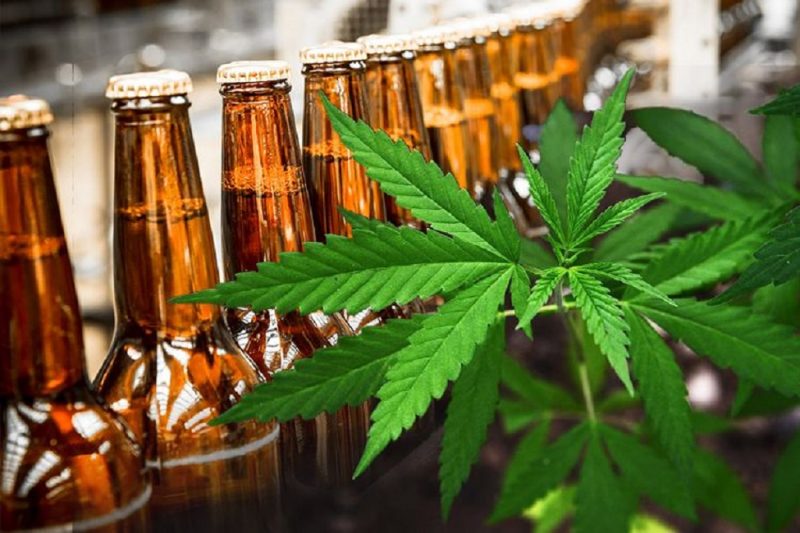Study: Non-psychotropic cannabinoid and hallucinogenic substance demonstrate promise in treating alcoholism
”CBD reduces the overall level of alcohol drinking in animal models of AUD by reducing ethanol intake, motivation for ethanol, relapse, anxiety and impulsivity,” say researchers
Scientists are delving into the possibility of using cannabinoids to treat Alcohol Use Disorder (AUD). It’s not just cannabis that has grasped the attention of scientists but also, a psychedelic compound produced by over 200 species of mushrooms called Psilocybin.
Despite being a widely regulated substance, alcohol kills more than three million people worldwide on an annual basis. Cannabis, on the other hand, is a natural plant that remains illegal at the federal level, yet it has never caused a fatal overdose. This has been confirmed by the Drug Enforcement Administration (DEA).
When you consider the widespread medical properties of cannabis, which include its anxiolytic, anti-inflammatory, antipsychotic and antiemetic effects, it seems unjust that the green leafy plant is still illegal at the federal level.
CBD for alcohol dependence: Cannabis and alcohol have contrasting effects on the brain
Not only is cannabis and alcohol’s legal status different but also, the effect(s) that each substance has on the brain. Alcohol is a depressant that reacts negatively with the brain, whereas cannabis reacts with cannabinoid receptors scattered throughout the immune system and brain to produce a range of therapeutic, psychoactive, stimulating and/or sedating effects; the plant’s effects are dependent on the strain.
Based on statistics released by the National Institute on Alcohol Abuse and Alcoholism, as many as 16 million residents of the United States struggle with AUD. Someone who endures this debilitating condition may feel a lack of control over how much alcohol they consume. When they are not able to get their alcohol fix, individuals who have been diagnosed with this chronic relapsing brain disease are at risk of falling into bouts of depression.
Traditional methods of treatment for AUD include behavioral therapy, counseling sessions, psychotherapy, and FDA-approved medicines like Naltrexone, Acamprosate and Disulfiram. However, these methods are not always effective.
Thankfully, scientists may have just identified some new treatment options for people with alcohol dependence. Two studies published during the month of May highlighted the potential of using Psilocybin and CBD for alcohol dependency. What scientists discovered was that each of the naturally-occurring substances offer a whole lot more for consumers than just recreational enjoyment.
Separate studies explore potential of using Psilocybin and CBD for alcohol dependency
The cannabis-focused study, which was featured in the journal Frontiers in Pharmacology, concluded that CBD minimizes brain damage caused by alcohol dependence. CBD appeared to alter immune system functioning and aid it in restoring impairments.
”CBD reduces the overall level of alcohol drinking in animal models of AUD by reducing ethanol intake, motivation for ethanol, relapse, anxiety and impulsivity,” said the researchers, who investigated the non-psychotropic cannabinoid’s antioxidant and immunomodulatory properties in order to draw up a conclusion.
A separate study that honed in on Psilocybin’s influence on the alcohol-inflicted brain was an anonymous online survey published in the Journal of Pharmacology. Primarily, it focused on LSD, which can be 100 times stronger than Psilocybin.
A total of 343 study subjects – most of whom reportedly battled with seven years of “problematic alcohol use” – were questioned about their symptoms after using psychedelic substances. Amazingly, 83 percent of the study subjects claimed they no longer experienced the symptoms of AUD after using hallucinogens.
“A greater psychedelic dose… [was] associated with a greater reduction in alcohol consumption,” said the researchers, who confirmed that 36 percent of anonymous study subjects consumed high doses of psilocybin, A.K.A. “magic mushrooms”, while an additional 36 percent consumed large quantities of LSD.
When administered to patients with alcohol dependence, CBD and Psilocybin successfully slowed down the rate of damage caused to the brain and liver. What’s more, in some instances, the controlled substances – Psilocybin, like cannabis, is also a Schedule I drug under the Controlled Substances Act – were capable of actually repairing brain and liver deterioration caused by excessive alcohol intake.
Considerations regarding the use of psychedelics and cannabis for alcohol dependency
Aside from the potential of using psychedelic substances and the non-psychoactive cannabinoid CBD for alcohol dependency, both substances analyzed in the aforementioned studies have previously been studied for their ability to treat anxiety and post-traumatic stress disorder (PTSD), too. A previous study also showed how psychedelics may even enhance a person’s creativity and wisdom.
Although promising, both cannabis and Psilocybin are still illegal at the governmental level. More clinical trials and research must commence if scientists are to fully determine the efficacy of using either substance to treat AUD. Unfortunately, due to federal restrictions on these Schedule I substances, a major change needs to occur on a governmental scale in order to expose their true impact on the human brain.








